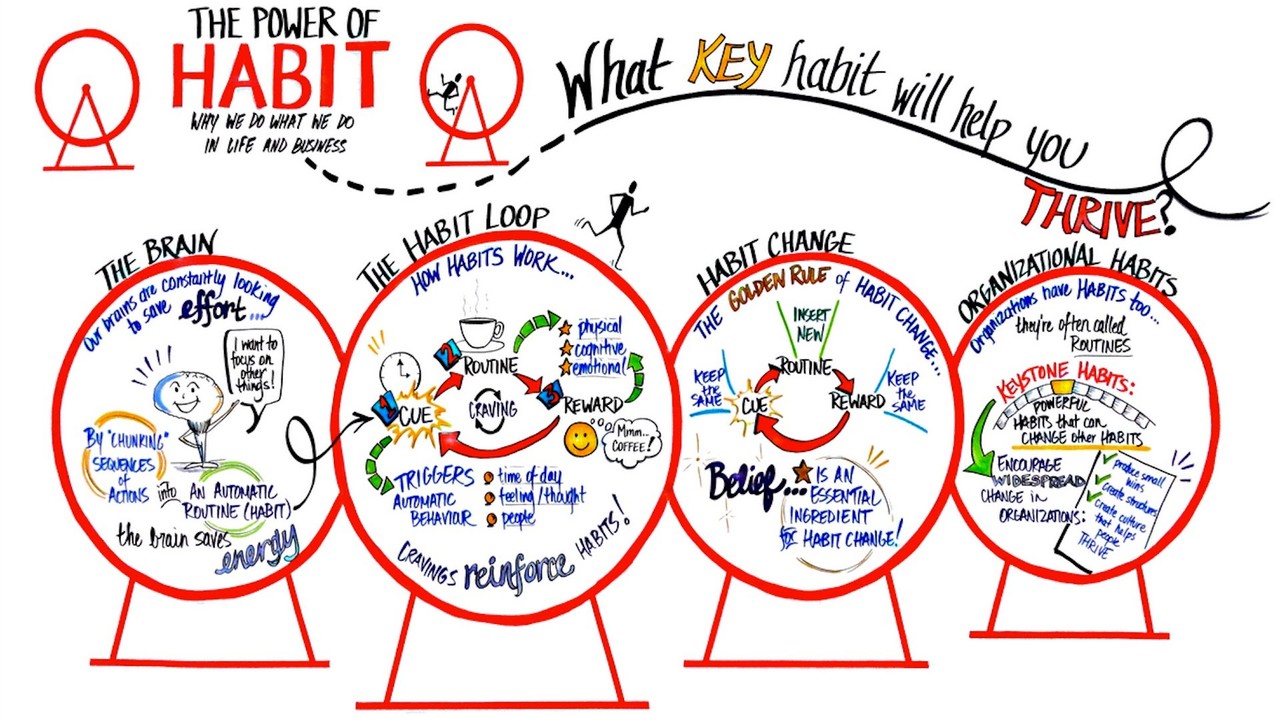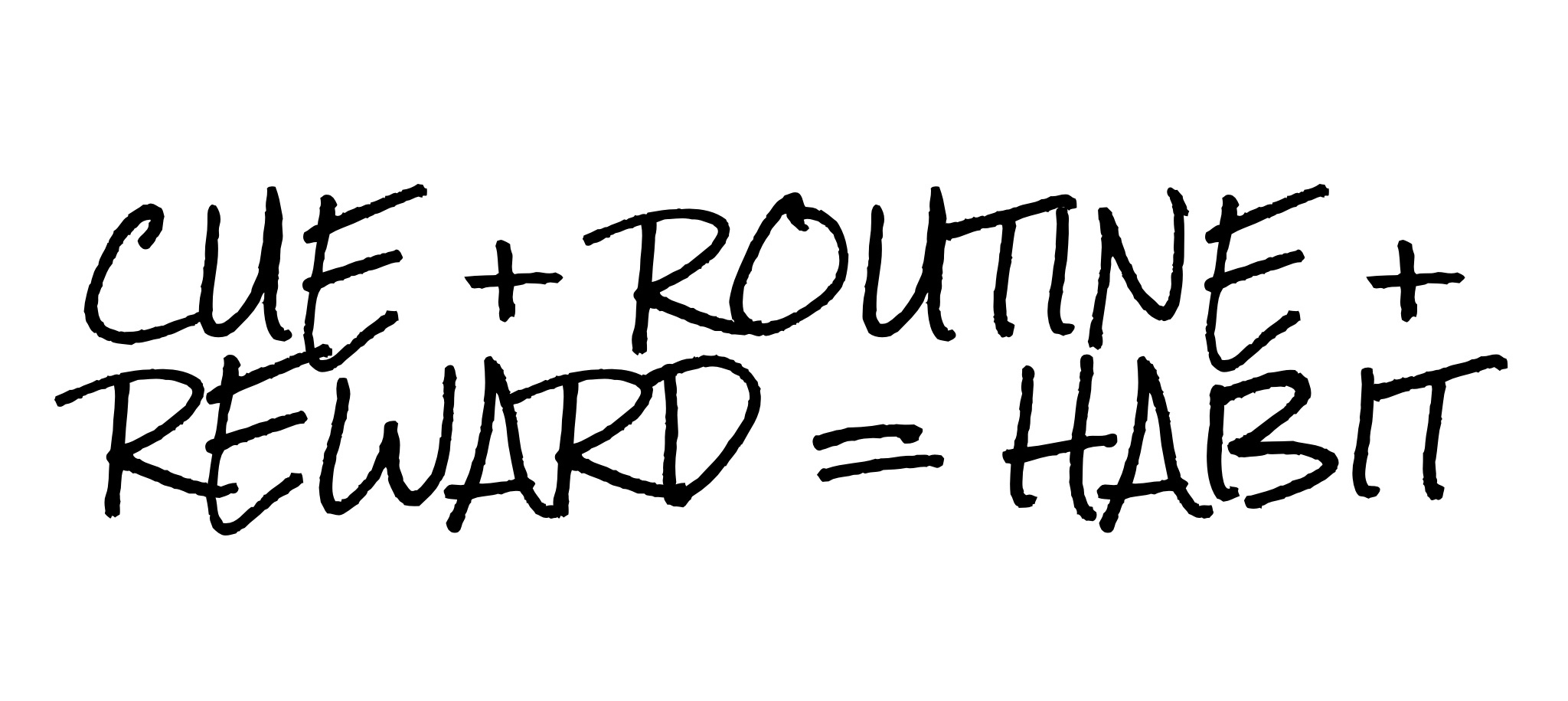The Power of Habit; How Routine Shape our lives
Habits are automatic behaviors performed regularly with little or no conscious thought. They are ingrained in our daily lives and often dictate our actions, influencing everything from personal routines to professional practices. Habits can be both beneficial and detrimental, shaping our lifestyles and impacting our long-term success and well-being.
The Habit Effects

Neuroscientific research has revealed the intricate mechanisms underlying habit formation in the brain. The basal ganglia, a region involved in motor control and procedural learning, plays a central role in habit formation. When a behavior becomes habitual, it becomes increasingly automatic, shifting from conscious decision-making to subconscious execution.
The process of habit formation typically involves several stages, including cue recognition, behavior enactment, and reward anticipation. Repetition strengthens the neural pathways associated with the habit, making it more automatic over time. Consistency and reinforcement are key factors in solidifying habits.
While habits can be difficult to break, they are not immutable. Understanding the mechanics of habit formation allows individuals to modify their habits consciously. Strategies such as identifying triggers, replacing negative habits with positive ones, and creating new reward systems can facilitate habit change and transformation.
Some habits, known as keystone habits, have the power to initiate a ripple effect, leading to positive changes in other areas of life. By focusing on changing keystone habits, individuals can leverage their transformative potential to enact broader lifestyle changes and personal growth.
Habits are not limited to individuals; they also shape the culture and practices of organizations. By understanding organizational habits and implementing strategies for habit formation and change, leaders can cultivate more productive, innovative, and resilient workplaces.
Willpower and discipline play significant roles in habit formation and maintenance. However, relying solely on these traits may not always be effective in sustaining long-term behavioral changes. Instead, creating conducive environments, establishing supportive social networks, and employing habit-forming techniques can complement willpower and enhance success.
Habits profoundly influence health and wellness outcomes, impacting factors such as diet, exercise, sleep, and stress management. By cultivating healthy habits and breaking unhealthy ones, individuals can improve their overall well-being and reduce the risk of chronic diseases.
Successful individuals often attribute their achievements to disciplined habits and routines. Whether in business, sports, academics, or creative endeavors, cultivating productive habits can fuel success, enhance performance, and foster continuous improvement.
In today's digital age, technology and media play a significant role in shaping habits and behaviors. The design of digital interfaces, such as social media platforms and mobile applications, often incorporates principles of habit formation to encourage user engagement and retention.
While habits can be powerful tools for personal development and achievement, they also raise ethical considerations, particularly concerning manipulation and addiction. Ethical frameworks should guide the design and implementation of habit-forming technologies and interventions to prioritize user well-being and autonomy.
Habit formation is influenced by cultural norms, societal values, and environmental factors. Understanding cultural differences in habit formation can inform interventions and strategies tailored to diverse populations, promoting inclusivity and effectiveness.
Psychological theories, such as operant conditioning, classical conditioning, and social learning theory, provide insights into the mechanisms underlying habit formation and change. By applying principles from these theories, individuals can leverage psychological processes to modify their habits effectively.
Habits are closely intertwined with one's identity, reflecting personal values, beliefs, and aspirations. Modifying habits often involves a deeper reflection on one's identity and self-concept, as individuals strive to align their behaviors with their ideal selves.
Effects of Routine
Routines play a fundamental role in shaping our lives in numerous ways, influencing our behavior, mindset, and overall well-being. Here's a detailed explanation of how routines impact various aspects of our lives: Routines provide structure and stability to our daily lives. They establish a framework of predictability and reliability, helping us navigate through the complexities of modern living. By following a consistent routine, we create a sense of order and control, reducing stress and anxiety associated with uncertainty.
Routines provide structure and stability to our daily lives. They establish a framework of predictability and reliability, helping us navigate through the complexities of modern living. By following a consistent routine, we create a sense of order and control, reducing stress and anxiety associated with uncertainty.
It also facilitate effective time management by allocating specific time slots for various activities and tasks. By adhering to a predetermined schedule, we optimize our productivity and make efficient use of our time. Routines help us prioritize tasks, set deadlines, and maintain focus, enabling us to achieve our goals and objectives more effectively.
Routines provide a conducive environment for establishing and maintaining healthy habits. By incorporating activities such as exercise, healthy eating, adequate sleep, and relaxation into our daily routines, we promote physical and mental well-being. Over time, these habits become ingrained in our lifestyle, contributing to long-term health and vitality.
Consistent routines promote productivity and enhance performance in various domains, including work, academics, and personal projects. By following a structured routine, we develop a rhythm of work and rest, optimizing our energy levels and cognitive resources. Routines help us stay focused, motivated, and disciplined, leading to higher levels of achievement and success.
Routines cultivate discipline and self-control by instilling regularity and consistency in our behavior. By adhering to a routine, we practice delayed gratification, resist temptations, and overcome procrastination. Routines help us develop the willpower and resilience necessary to pursue our long-term goals and resist distractions and impulses that may derail our progress.
Following a routine builds confidence and self-efficacy by demonstrating our ability to take control of our lives and accomplish tasks systematically. As we consistently meet our daily commitments and achieve small victories, we develop a sense of competence and self-assurance. Routines foster a positive feedback loop, reinforcing our belief in our capabilities and motivating us to tackle more significant challenges.
Contrary to popular belief, routines can also foster creativity and innovation by providing a stable foundation for exploration and experimentation. By establishing a routine that includes dedicated time for creative pursuits, such as brainstorming, problem-solving, and artistic expression, we stimulate our imagination and foster divergent thinking. Routines create a conducive environment for creative insights to emerge, leading to novel ideas and breakthroughs.
Routines play a vital role in strengthening relationships and fostering social connections. Shared routines, such as family meals, weekend rituals, and group activities, create opportunities for bonding and communication. By engaging in consistent routines with loved ones, we deepen our connections, build trust, and create lasting memories. Routines also provide a sense of belonging and stability within social groups and communities.
Routines contribute to emotional well-being by promoting a sense of security, predictability, and purpose. Following a routine can help regulate emotions, reduce stress, and promote mental health. Routines provide a sense of accomplishment and satisfaction as we progress towards our goals and fulfill our responsibilities. Additionally, routines create opportunities for self-care and relaxation, allowing us to recharge and rejuvenate amidst life's demands.
Summary
Routines wield a significant influence over our lives, serving as the scaffolding upon which we build our daily existence. Through the consistent practice of routines, we establish a framework that not only organizes our actions but also molds our mindset and shapes our outcomes.
First and foremost, routines provide us with the essential structure necessary for navigating the complexities of modern life. By adhering to a set schedule or sequence of activities, we create a sense of predictability and stability that helps us manage our time and responsibilities more effectively.
Moreover, routines act as catalysts for productivity, guiding us through our daily tasks with efficiency and purpose. By allocating specific time slots for work, leisure, and self-care, we optimize our energy and focus, maximizing our potential for accomplishment.
But the benefits of routines extend far beyond mere productivity. By incorporating healthy habits into our daily routines, such as exercise, nutritious eating, and adequate rest, we promote our physical and mental well-being. These habits, when practiced consistently, become ingrained in our lifestyle, contributing to our overall vitality and longevity.
Furthermore, routines play a crucial role in fostering personal growth and development. Through the disciplined pursuit of daily rituals, we cultivate traits such as discipline, resilience, and self-confidence. Over time, these qualities become deeply ingrained within us, shaping our character and propelling us towards our goals.
Additionally, routines serve as a cornerstone for building and nurturing relationships. Shared rituals, whether it be family dinners, weekend outings, or daily check-ins with loved ones, create opportunities for connection and bonding. By engaging in these routines together, we strengthen our emotional ties and foster a sense of belonging within our social circles.
Ultimately, the power of habit lies in its ability to transform our lives from the inside out. By understanding the underlying mechanics of habit formation, we gain the knowledge and insight necessary to cultivate positive habits, break free from detrimental ones, and chart a course towards a more fulfilling and purposeful existence. Whether it's through small daily rituals or overarching lifestyle changes, the choices we make in our routines have the potential to shape not only our individual lives but also the broader fabric of society.













































